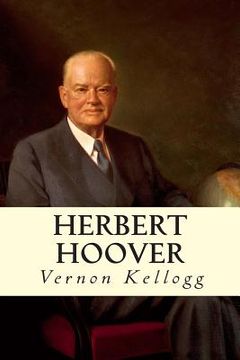Reseña del libro "Herbert Hoover (en Inglés)"
Herbert Hoover, by Vernon Kellogg, is a classic US president biography. Herbert Clark Hoover (August 10, 1874 - October 20, 1964) was an American engineer, businessman and politician who served as the 31st President of the United States from 1929 to 1933 during the Great Depression. A Republican, as Secretary of Commerce in the 1920s he introduced themes of efficiency in the business community and provided government support for standardization, efficiency and international trade. As president from 1929 to 1933, his domestic programs were overshadowed by the onset of the Great Depression. Hoover was defeated in a landslide election in 1932 by Democratic Franklin D. Roosevelt, who promised a New Deal. After this loss, Hoover became staunchly conservative, and advocated against Roosevelt's New Deal policies. Claiming to be the first student from Stanford University, Hoover would go on to a successful mining engineer career around the globe until he retired in 1912-he is the only president to have known Mandarin Chinese. In the First World War, Hoover built an international reputation as a humanitarian by leading relief efforts in Belgium during the war, and in Eastern Europe afterwards. He headed the U.S. Food Administration during World War I. His reputation as a progressive businessman fighting for efficiency and elimination of waste was built by his service as an atypically prominent Secretary of Commerce (1921-1928). Hoover was a leader in the Efficiency Movement, which held that every institution public and private was riddled with unsuspected inefficiencies. They all could be improved by experts who could identify the problems and solve them. He also believed in the importance of volunteerism and of the role of individuals in society and the economy. In the presidential election of 1928, Hoover easily won the Republican nomination, despite having no elected-office experience. Although Hoover never raised the religious issue, some of his supporters mobilized anti-Catholic sentiment against his opponent Al Smith. This, combined with Hoover's "lily-white southern strategy" which insulted African Americans who had before "Redemption" been the main and in some cases only GOP base in the South, led to an unprecedented swing toward the GOP within the then-Democratic "Solid South". Consequently, Hoover defeated Smith in a landslide, becoming the first Californian and Western President. Hoover's tenure was defined by his response to the Wall Street Crash of 1929 which struck less than eight months after he took office. He introduced large-scale government public works projects such as the Hoover Dam, but believed private initative could lead to recovery better than government stimulus; historians see Hoover's economic policies as too limited to deal with the economic crisis. Hoover called on industry to keep wages high while scapegoating Mexican Americans and Mexican immigrants for the downturn. Hoover championed the mass ethnic cleansing campaign known as the Mexican Repatriation, where between five hundred thousand and two million Mexican Americans and immigrants were deported to Mexico-a supermajority were citizens, with an estimated sixty percent being natural-born citizens. The construction of the Hoover Dam and the Repatriation both ended in 1936, after Hoover left office. In 1930, Hoover reluctantly approved the Smoot-Hawley Tariff to balance the budget, which sent foreign trade spiralling down and is seen by historians to have worsened the economy, which fell further. The unemployment rate reached 25%, with heavy industry, mining and wheat and cotton farming hit especially hard. This downward spiral continued, while Hoover expressed consistent optimism about the economy. The burgeoning homeless population lived in shantytowns called Hoovervilles. The Depression, along with his support for the unpopular prohibition of alcohol, set the stage for Hoover's overwhelming defeat in 1932.

